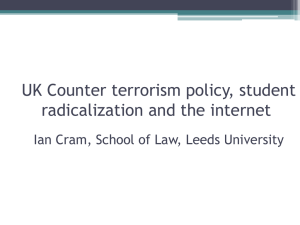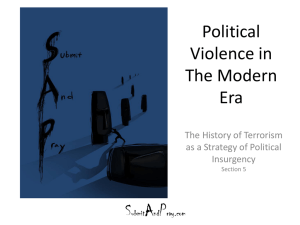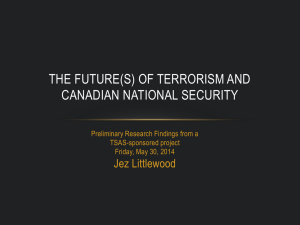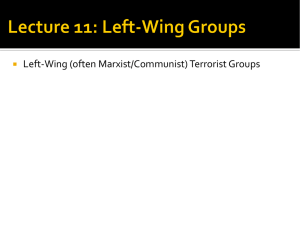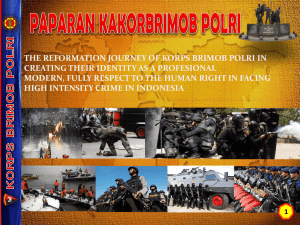THAI PRESENTATION 12-2
advertisement
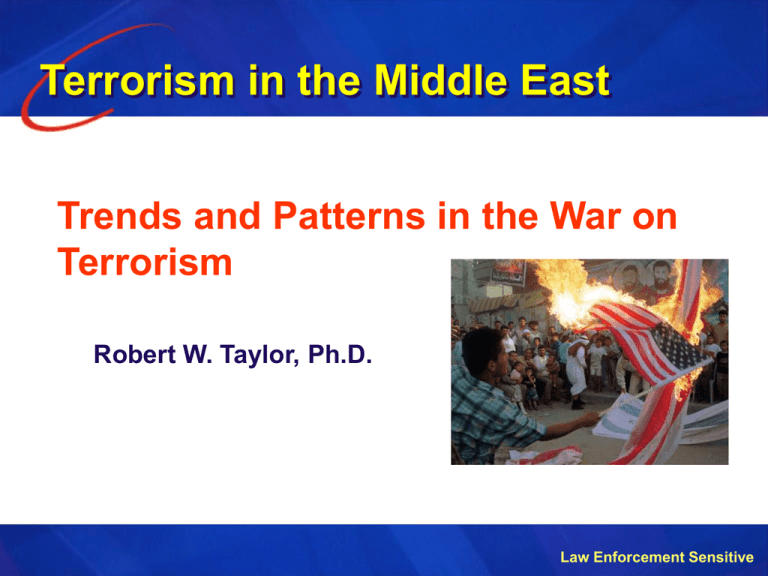
Terrorism in the Middle East Trends and Patterns in the War on Terrorism Robert W. Taylor, Ph.D. Law Enforcement Sensitive Terrorism in the Middle East Methodology for Our Discussion Introduction and Understanding Terrorism in General Understanding Islam in the Middle East Radical and Fundamental Islamic Philosophies Identify Trends and Patterns in Recent Bombings and Activities Thoughts on the Future Law Enforcement Sensitive Terrorism in the Middle East Defining Terrorism International terrorism Transnational terrorism Domestic terrorism State terrorism Terrorism vs. war “Terrorism plays to emotion, not intellect” Law Enforcement Sensitive Terrorism in the Middle East Know Your Adversary “If you know the enemy and know yourself, you need not fear the results of a hundred battles. If you know yourself and not the enemy, for every victory gained, you will also suffer a defeat. If you know neither yourself or the enemy, you succumb in every battle” Sun Tzu—The Art of War Law Enforcement Sensitive Terrorism in the Middle East Law Enforcement Sensitive Terrorism in the Middle East What Is Middle-Eastern Culture? There in no single culture embracing the entire Middle East -It is a complex and unique cultural area Law Enforcement Sensitive Terrorism in the Middle East What Is Middle-Eastern Culture? Depends on perspective To approach suspects, victims, and witnesses in Middle-Eastern communities National origin and politics Religious orientation Friendship networks and associations Arab, Bedouin, Mede, Turk, Asian, Pakistani, Iranian, North African, Sub-Saharan African? Law Enforcement Sensitive Terrorism in the Middle East Middle East Understanding Islam Law Enforcement Sensitive Terrorism in the Middle East Prophet Mohammed Founder of Islam, born in Mecca Received revelations about God (Allah) from the archangel Gabriel Wrote revelations in a series of verses and poems, which later became the Quran (Koran) Driven from Mecca to Medina, where his following grew Died in 632 and left growth of Islam to his followers Law Enforcement Sensitive Terrorism in the Middle East Two Islamic Traditions: Sunni and Shiite Sunni – “True Path of Allah” strongly associated with Saudi Arabia… The majority of Muslims in the world Shiite – Leaders are descended from Mohammed through Fatima (daughter) and Ali (cousin)– “Shi’at Ali” Leaders are divinely inspired and infallible… Strongly associated with Iran… Only about 10% of the Muslim World Law Enforcement Sensitive Terrorism in the Middle East Understand the Differences Sunni vs. Shi`ite Sheik Omar Rahman Veiled Shi`ite woman Law Enforcement Sensitive Terrorism in the Middle East Understand Islam NOT a violent religion Cousin to Judaism and Christianity Equalizes classes through love of God Submission to the will of God Muslim is one who submits Understand the real meaning of “jihad” Law Enforcement Sensitive Terrorism in the Middle East Five Pillars of Islam Five Pillars of Islam are the framework of the Muslim life Testimony of Faith (Shahada) Daily Prayer (Selah) Support of the Needy (Zakah) Fasting during Ramadan (Sawm) Pilgrimage to Mecca (Hajj) Law Enforcement Sensitive Terrorism in the Middle East Pillar 1: Shahada The testimony of faith is saying with conviction “La ilaha illa Allah, Muhammadur rasoolu Allah” “There is no true god but Allah, and Muhammad is his Prophet” Law Enforcement Sensitive Terrorism in the Middle East Pillar 2: Prayer (Selah) Muslims perform five prayers a day Each prayer does not take more than a few minutes Prayer in Islam is a direct link between the worshipper and Allah In prayer, a person feels inner happiness, peace, and comfort and that Allah is pleased with him or her Prayers are performed at dawn, noon, mid-afternoon, sunset, and night Law Enforcement Sensitive Terrorism in the Middle East Pillar 3: Giving Zakah All things belong to Allah, and wealth is therefore held by human beings in trust The original meaning of the word zakah is both “purification” and “growth” Giving zakah means “giving a specified percentage of certain properties to certain classes of needy people” (tithe) Law Enforcement Sensitive Terrorism in the Middle East Pillar 4: Fasting Every year in the month of Ramadan, all Muslims fast from dawn until sundown, abstaining from food, drink, and sexual relations Fasting is regarded principally as a method of spiritual self-purification By cutting one’s self off from worldly comforts, even for a short time, a fasting person gains true sympathy with those who go hungry, as well as achieves growth in his or her spiritual life Law Enforcement Sensitive Terrorism in the Middle East Pillar 5: Pilgrimage to Mecca The annual pilgrimage (Hajj) to Mecca is an obligation (once in a lifetime) for those who are able to perform it About two million people go to Mecca each year from every corner of the globe Hajj is performed in the twelfth month of the Islamic calendar Male pilgrims wear special simple clothes that strip away distinctions of class and culture so that all stand equal before Allah Law Enforcement Sensitive Terrorism in the Middle East Hajj Law Enforcement Sensitive Terrorism in the Middle East Religious Fundamentalism in Islam: The Purification Movements Wahhabism—movement related to Saudi Arabia— Muhammad Ibn Abd al-Wahhab (1703-1792). Reform movement that believes that absolutely every tenant added to Islam after the third century of the birth of Islam is corrupted. Keep the original rituals and practices of Islam. Foreign interests and modernity threaten this way of life. Law Enforcement Sensitive Terrorism in the Middle East Religious Fundamentalism in Islam: The Purification Movements The Muslim Brotherhood --- movement related to Egypt and the “scholarly tradition” of Hasan al-Banna (1906-1949), Sayyid Qutb (1906-1966), Sheik Omar Rahman, and Ayman al Zawahiri (Sunni). Indigenous political-religious movement against European colonial powers that eroded Islamic culture. There is no middle ground – only good and evil. Implement a new Islamic order through “jihad” or “holy war” primarily against corrupt Middle Eastern regimes and now the West. Law Enforcement Sensitive Terrorism in the Middle East Religious Fundamentalism in Islam: The Purification Movements Salafism – movement related to Egypt and the writings of Muhammad Abduh (1849-1905) and Rashid Rida Emphasizes the self-sufficiency and expansiveness of Islam (much more tolerant than ancient Wahhabism) Modernity has value for Islam (hence, not necessarily antiWestern). Recognized the exploitation for oil. Today, a broad philosophy of intellectual and cultural undertaking, usually not political. Law Enforcement Sensitive Terrorism in the Middle East Religious Fundamentalism in Islam: The Purification Movements Jihadist Salafism – movement of the second generation Salafists, radicalized in the 1980s by the Soviet-Afghan War Embraces a strict and literal interpretation of Islam Violence (‘jihad’) is the instrument to drive out the West and destroy corrupt Middle Eastern regimes Charismatic leadership of Usama bin Laden Al-Qaeda now morphing into Southeastern Asia with Jemaah Islamiah and Turkey with IBDA/C Law Enforcement Sensitive Terrorism in the Middle East Religious Fundamentalism in Islam: The Purification Movements Khomeinism—movement of Shi’a Islam as the supreme force in the Middle East Non-secular, religion and government are the same Led by Iran’s Revolutionary Council Surging as a result of Iraqi War Hizb’Allah is Iran Greatly expanded drug (opium) and gun trafficking in Turkish and Central Asian Regions Law Enforcement Sensitive Terrorism in the Middle East Islamic Fundamentalism—Ideology No separation between church and state Secularism leads to the marginalization of religion Secularism and modernity are inseparable Leading to political and moral decay Secularism is direct threat to Muslim identity Only solution is to “Re-Islamasize” the Muslim world Return to the ways of the old Common enemy is the West and ME governments friendly to the West Law Enforcement Sensitive Terrorism in the Middle East Fundamentalism in General Charismatic leaders Usama bin Laden, Abdul Rahman, Jim Jones, David Koresh Selective interpretation of scriptures and other important writings Bible, Quoran, Old Revolutionary Writers Apocalyptic mission Misapplication of symbolic words Christian Patriot, constitutionalist, jihad God speaks to them directly, justifying violence Justifies the use violence due to loss of morality … save the world Law Enforcement Sensitive Terrorism in the Middle East Law Enforcement Sensitive Terrorism in the Middle East al Qaeda Usama bin Laden Law Enforcement Sensitive Terrorism in the Middle East al Qaeda Leadership Usama bin Laden ? Ayman Al-Zawahiri ? Mohammed Atef Dead Law Enforcement Sensitive Terrorism in the Middle East al Qaeda Usama bin Laden Nairobi, Kenya, 1998 Leadership: Usama bin Laden, in 1988 Ideology: al Qaeda is a network of many different fundamentalist organizations in diverse countries Remember the purification movements Common factors are the use of terrorism for the attainment of their political goals and an agenda whose main priority is the overthrow of the “heretic governments” and the establishment of Islamic governments based on the rule of “Shariah” The Soviet-Afghan War (1979-1989), the fall of Russia, and the rise of the Mujahadeen (Holy Warriors) and UBL August 1996—bin Laden issued a “declaration of war” against “the Great Satan,” the United States Law Enforcement Sensitive Terrorism in the Middle East al Qaeda Usama bin Laden (continued) February 1998—bin Laden stated, “If someone can kill an American soldier, it is better than wasting time on other matters” 1998—bombings of the U.S. Embassies in Kenya and Tanzania—killed 224 2000—suicide bombing of USS Cole in Yemen—killed 17 sailors 2001—suicide bombings at the World Trade Center, the Pentagon, and a United jet in Pennsylvania—killed 2,800+ Law Enforcement Sensitive Terrorism in the Middle East September 11, 2001 Law Enforcement Sensitive Terrorism in the Middle East Al Qaeda—New Threats Morphing into other groups and areas Active in Southeast Asia, Middle East, and Europe Capitalizing on Islamic Fundamentalism Social and political crisis Drawing on revolutionary religious leaders of the past Linking with smaller Islamic Fundamentalist groups Using regional networks to continue the fight Commonality – Trained in Afghanistan and Pakistan Major target acquisition and event planning These people are at war! Law Enforcement Sensitive Terrorism in the Middle East Fundamentalism in Southeast Asia Jemaah Islamiya Bali bombing—J. W. Marriott bombing in Jakarta, active in the Philippines with al Qaeda Leadership under Abu Bakar Bashir, Khalid Sheik Mohammad, Riduan Ismuddin (Hambali) Goal—establish Islamic state across Southeast Asia Linked to Moro Islamic Liberation Front (fighting a guerrilla war for 25 years in Mindanao) (training camps) Poses significant new threat to Western interests “Project Bojinka” and Ramzi Youseff (1995) Law Enforcement Sensitive Terrorism in the Middle East Fundamentalism in Southeast Asia Abu Sayyaf Primarily in the Philippines Kidnapping, rape, prostitution, and drug trafficking A bunch of thugs using Islamic Fundamentalism as a cover Law Enforcement Sensitive Terrorism in the Middle East Review of Recent Bombings London bombings (July 7, 2005) killed 55, wounded 700 in suicide attacks on transit system; July 21 unsuccessful attacks (not suicidal) Sharm el-Sheikh Resort in Egypt (July 23, 2005) suicide attack killed 90 and wounded 240; linked to earlier attack on Taba Resort in October 2004 with 25 dead Madrid, Spain (March 11, 2004) suicide bombing of train station killed 190 people Istanbul, Turkey (November 15 and 20, 2003) suicide bombings of two synagogues, a London-based bank, and the British Consulate killed 62 people Suicide attack Bali bombing in Indonesia (October 12, 2002) killed 202; JW Marriott bombing Continued activities in Iraq Law Enforcement Sensitive Terrorism in the Middle East Bali Bombing (October 12, 2002) Killed 202 people Directly linked to Jemaah Islamiyah and Abu Sayyaf (Philippines and MILF) Funnel-bombing techniques Traded drugs for bomb materials and ammonium nitrate (fertilizer), not C4 2005—Abu Bakr Bashir charged in bombing (later overturned) Bashir trained in Afghanistan, member of Mujahadeen (Riduan Ishmudden, aka Hambali, arrested in Thailand) Directly linked to Project Bojinka—January 1995? Law Enforcement Sensitive Terrorism in the Middle East Istanbul Bombings (November 2003) Linked to IBDA/C (Great Eastern Islamic Fighters) Relatively small, unknown group that had tossed a few Molotov cocktails Sunni radical leaders—jihadist salafist ideology Suicide truck bombings Used trucks packed with explosives (NH4NO3) Well-organized and internationally supplied (TNP suspects Iran) Suspect Baki Yigit trained in Afghanistan and met with UBL; had been arrested for drug trafficking by the TNP 18 people involved, including 2 women Law Enforcement Sensitive Terrorism in the Middle East Spain Bombings (March 11, 2001) 190 killed, over a thousand injured At least linked with another group(s): 12 Moroccans arrested—one Moroccan suspect at large lived in Turkey and had previous connections to al Qaeda and IBDA/C Similar explosive techniques as recently seen in London (multiple attacks on trains) Large-scale attack, using multiple bombs and funneling Significant planning and multiple operatives The only Spaniard, Jose Suarez, traded hashish for at least part of the explosives Linked to Abu Musab al-Zarqawi (Jordanian al Qaeda member from Afghanistan camps) Linked to Hezb’ Allah (Iran) for funding Law Enforcement Sensitive Terrorism in the Middle East London Bombings (July 7, 2005) Killed 55, wounded over 700 Four total bombers; three different trains and one double-decker bus Hassib Hussain, Mohammad Sadique Khan, Shehzar Tanveer, and Haroon Rashid Aswat (all Pakistani) Khan in NYC in 1995, traveled extensively and Pakistani Aswat (suspected mastermind) met Bin Laden in Afghanistan in 1995 All were in Karachi, Pakistan, in July or April 2004 (suspected of drug trafficking from the Golden Crescent) Law Enforcement Sensitive Terrorism in the Middle East London Bombings (July 7, 2005) (continued) Hasib Hussain connected to Sheik Omar Bakri Mohammad and al-Mahajroun in London (Pakistani with deep Afghani roots) Mastermind fled to Egypt: Majdi al Nasher (chemist) released by Egyptian authorities British official—“Same signature as the Madrid bombings”: that means funnel bombings and ties to drugs for trade for explosives Law Enforcement Sensitive Terrorism in the Middle East London Bombing (July 21, 2005) Copycat attack 7 arrested, including 4 East Africans from London (Eritrea, Ethiopia, Somalia) Bombs failed; not the same substance or device types as previous bombings Not suicidal attacks Probably more connected with internal London issues than global terrorism Law Enforcement Sensitive Terrorism in the Middle East Sharm el-Sheikh in Egypt (July 23, 2005) Suicide bombing (truck driven into hotel, very similar to Istanbul bombing; 90 dead, 240 injured in three separate attacks (two by truck and one in a sack at a bus station) Two identified bombers—Mohammad Badran Hanafi from the Tawhid and Jihad Group (old Salafi group linked to Bin Laden through the Egyptian Muslim Brotherhood) and Mohammad Saleh Fleifel (Pakistani with forged passports) Connected to Taba Resort bombing in October 2004—25 dead; Suleiman Fleifal was one of two suicide bombers Fleifal brothers were in Afghanistan in the 1990s Law Enforcement Sensitive Terrorism in the Middle East Activities in Iraq The Peace Process and withdrawal of U.S. troops (actually increasing through 2006 with 135,000 troops) A “Federated” State Understand the linkage between Hezb’Allah and Iran 62% of population in Iraq is Shiite Al-Sistani wisdom via Abu Bakir Bashir in Kum, Iran— be patient! Increase in bombing activities (NH4NO3) Law Enforcement Sensitive Terrorism in the Middle East Commonalities By method of operation and tactics—multiple attacks and most are sophisticated suicidal attacks By financing from viable ME countries or groups (Iran and Hezb’Allah—DRUG CONNECTION) By radical Islamic philosophy (Sunni and Shiite) Many are members of the original Mujahadeen in Afghanistan, or at least trained in Afghani camps (remember Ahmed Ressam) Stepped-up activity because of Iraq All connected to UBL and al Qaeda for leadership during the same period of time—what is al Qaeda now? Law Enforcement Sensitive Terrorism in the Middle East The New al Qaeda “The imperative of individual jihad fused with collective revenge” for America’s perceived global war on Islam. Enemy is the West and Middle East puppet governments Expansion presented by the occupation of Iraq—win the war lost in Afghanistan Sunni-Shiite collaboration Competent and determined leadership cadre with adequate finances (drugs, human, and arms dealing) Growth through new Islamic alliances and recruitment of youth, again fueled by Iraq War (e.g., Southeast Asia, Colombia, Central Asian Republics) “A remarkably nimble, flexible, and adaptive entity” Law Enforcement Sensitive Terrorism in the Middle East New Trends in Financing Drug trafficking Golden Crescent routes and changes Golden Crescent now produces 92% of the world’s opium (since the Karzai government) Changes from heroin to meth (Operation Mountain Express— 2003) Linkages to Hezb’Allah Changes in Malaysia (potential link w/Thailand via smuggling) ‘Designer drugs’ e.g. ecstasy, yaya pills, Other smuggling Linkages with FARC and other Latin American Marxist groups Linkages with organized crime cartels Law Enforcement Sensitive Terrorism in the Middle East New Trends in Financing (continued) Human trafficking Middle East (Afghanistan and Central Asian Republics) Linked with organized crime—Russian Vory Cambodia, and Philippines Linked with madrasas in Southeast Asia (children) Linked with organized crime—Yakuza A word about Abu Sayyaf Kidnapping and extortion Links to Hezb’Allah Links to FARC and ELN Law Enforcement Sensitive Terrorism in the Middle East New Trends in Financing (continued) Credit card and passport fraud Contraband smuggling and trafficking Baby aspirin and formula, cigarettes, etc. Gold, diamonds, and other commodities Hawalas (secret transferring and funding of money—primarily gold (commodities) Charities fraud (like Holy Land Foundation and HAMAS) Often linked through Hezbollah in Lebanon Again, Shiite and Sunni cooperation Law Enforcement Sensitive Terrorism in the Middle East New Trends in Financing (continued) Arms trafficking Afghanistan and Central Asian Republics Chechnyans and, again, connected via Russian mob (Vory) Southeast Asia From Somalia, Cambodia, Vietnam, and other destabilized countries FARC and ELN Law Enforcement Sensitive Terrorism in the Middle East Potential Trends for Future Consideration Potential attacks involving Southeast Asia (let’s talk about it?) Very active in Malaysia, Indonesia, and the Philippines Instability of Southern Thailand…..what to do? The Middle East is too hot—organizations are in disarray and leadership is on the run! Where might they go? Jemaah Islamiyah, Hambali, Ramsi Youseff, and Project Bojinka (the new Kingdom of Islam) have historical linkages with Southeast Asia Porous U.S. border and rise in OTMs from Mexico Drug, human, and arms trafficking and linkages to US Law Enforcement Sensitive Terrorism in the Middle East Potential Trends for Future Consideration (continued) Target selection Virtually unlimited target acquisition and potential inside the United States Embassies still major targets Friendly countries Major symbolic targets in New York; Washington, DC; Chicago; and maybe Los Angeles are still the major hit areas Transit and transportation locations They know they can hurt us here again Potential for WMD ??? Law Enforcement Sensitive Terrorism in the Middle East Final Thoughts on the Future International connectivity of groups, especially along the lines of drug, human, and arms trafficking (financing) Increased radical factionalism and religious extremism This is not crime; it is war! Our criminal justice systems may be ill-equipped to handle such low-level conflict….how do we handle properly handle these types of situations??? We must understand the changing dynamics of terrorism— Continue to build strong partnerships between countries like the U.S. and Thailand Never give up on diplomacy! Law Enforcement Sensitive Terrorism in the Middle East Thank You! Robert W. Taylor, Ph.D. Professor and Chair Department of Criminal Justice University of North Texas Post Office Box 305130 Denton, Texas 76203-5130 Phone: (940) 565-4475 FAX: (940) 565-2548 Email: rtaylor@scs.unt.edu Law Enforcement Sensitive


